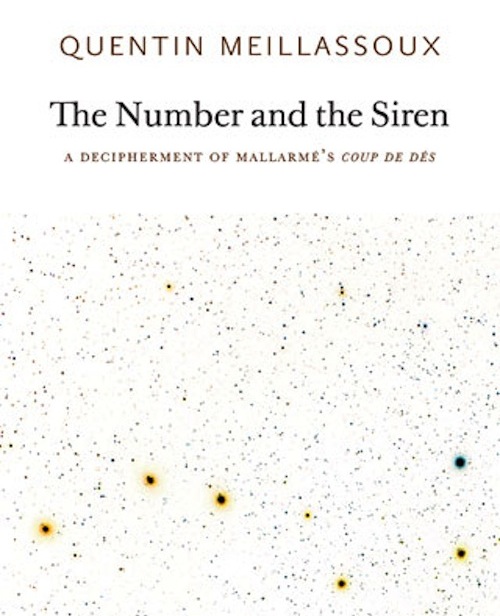Yes, Poetry as 'Diffusion of the Divine': Barry Schwabsky on Quentin Meillassoux on Stephane Mallarmé

Art writer, poet, and darewesay critic Barry Schwabsky has lent his hand to Hyperallergic again, having covered Peter Manson's new Mallarmé translation in late July. Schwabsky reviews, this time around, Quentin Meillassoux's The Number and the Siren: A Decipherment of Mallarmé's A Coup de Des. Regarding a general consensus that SM is "fundamentally misunderstood," Schwabsky writes:
That can be argued, but as Quentin Meillassoux points out in his recently translated study The Number and the Siren, what most commentators broadly agree on is that it is difficult is not because there is something hidden in it. In the words Meillassoux quotes from Jacques Rancière, “Mallarmé is not a hermetic author, he is a difficult author.” Pierre Macherey is of precisely the same opinion, and explains more fully what he means: “Mallarmé is not hermetic, in the sense of a well-hidden secret that ought to be found out; he is only difficult…. The secret is, finally, that there is no secret.” And as Meillassoux admits, albeit with some irony, this is precisely as we would hope it to be, for to encode a hidden meaning in this way “is basically something rather puerile, whatever its complexity; something devoid of literary value, in any case.” The situation is similar, one might say, to what makes mystery stories a subliterary genre: As Edmund Wilson asked, “Who cares who killed Roger Ackroyd?” Not to say that this encoding would necessarily deprive the work of value — but that value would still have to be situated somewhere beyond the code, just as, for instance, the mere fact that a work is constructed according to rhyme and meter would not give it literary value — the poetry subsists somewhere on the far side of that. But nonetheless, Meillassoux insists, Un coup de dès does conceal a secret, and he can tell us what it is.
He can? Incroyable. Schwabsky goes on:
But who is this Meillassoux who claims to have found what a century of readers have failed to find, and who is willing to point out a dimension of this foundational modern text that would be so contrary to modern aesthetics — more like a Baroque allegory, perhaps, than any work of modernity ought to be? He is a philosopher teaching at the École Normale Supérieure in Paris, a former student of Alain Badiou, and the author of several books, of which one has previously been translated into English, After Finitude: An Essay on the Necessity of Contingency (Continuum, 2008). He is a leading light of a philosophical trend called speculative realism, whose adherents are mainly active in England. However, and while it’s not insignificant that Mallarmé has attracted the attention of an unusual number of philosophers — Rancière, Badiou, Jacques Derrida, and Jean-Paul Sartre are only the first to come to mind — The Number and the Siren is not a book of philosophy but a very close empirical examination of Mallarmé’s poem.
I’ve never before written a review of a book on poetry in which I’ve had to watch out for spoilers, but in this case I think it really would be better if I tell you you’d better go read the book if you want to know the secret Meillassoux claims to have uncovered—and that despite the fact that he reveals it pretty early on in the book. The suspense isn’t so much about what the secret will be but about how he will convince you, if not to believe him, at least to suspend your disbelief. One Mallarmé authority I spoke to said the book seemed suspiciously like the old Douglas Adams novel in which the answer to the great question of life, the universe and everything turned out to be the number forty-two. One reason is that in his decipherment of Un coup de dès Meillassoux never entirely loses himself in its details; in fact, whether or not one accepts Meillassoux’s central contention, The Number and the Siren makes for the best overview of Mallarmé’s poetics that I know.
In particular, Meillassoux makes clear the poem’s relation to Mallarmé’s reflections on politics. This is all the more crucial as the poet is sometimes made to seem nothing more than a fabricator of crystalline literary baubles. Mallarmé was convinced that the civil state had need of a civil religion, what might be called a post-theistic secular Church. “Mallarmé thus considers as impossible a strict neutrality of the public domain that would reserve all spiritual impulses for the personal sphere alone,” Meillassoux points out. “There must be a common elevation.” Though Meillassoux doesn’t mention them, one thinks of the civic festivals promoted by the Jacobins in the wake of the French Revolution — for instance in Strasbourg, 30 Brumaire, Year II of the Revolution, when the cathedral was proclaimed a Temple of Reason and a choir of 10,000 voices sang hymns to this new deity under the sign, light after darkness. The Book of which Mallarmé dreamed—and which he presumably could not write because by nature it would have had to have been anonymous — was to be likewise the instrument of a new godless religion. Poetry, in this dream, was to be “a diffusion of the divine,” writes Meillassoux, “as opposed to its representation (the Greek scene), or its presentation (the Christian Parousia).”
The full piece is certainly worth a good read. Thanks to Schwabsky for pointing this one out.


